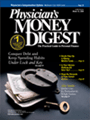Publication
Article
Physician's Money Digest
Protect Your Portfolio from Inflation
Author(s):
The economy may be on the mend,but physician-investors could soonface a new hurdle: rising inflation.Some economists predict inflation won'tbe a serious concern until 2005. However,many financial planners recommendpreparing your portfolio now, beforeprices actually spike.
Preparing for Inflation
New York Times
According to a recent report, the spread between the yield on10-year US Treasury inflation-protectedsecurities (TIPS) and 10-year non-indexedUS Treasuries has widened to 2.3 percentagepoints (from 1.7 in June). Analysts saythis is a sign that inflation—which hasbeen relatively low—may rise.
Citing the enormous amount of monetaryand fiscal stimulus injected into theeconomy in the past 2 years, JohnBollinger, president of Bollinger CapitalManagement, says the nation could beheaded toward 3% to 4% inflation in2004, with an "outside chance of seeing itnorth of 4%." John Caldwell, chief investmentstrategist for the McDonald FinancialGroup, doesn't expect that inflationwill be that high. He believes thatstrong economic growth and the FederalReserve's willingness to keep short-termrates low could produce inflation of morethan 2.5% this year.
Fund switch:
How can you prepare your portfoliofor inflation? According to MarilynCohen, president of Envision CapitalManagement, you don't have to changethe asset classes you invest in. However,you should change the way those assetsare invested. For example, she recommendsthat bond investors shorten theoverall duration or maturities of theirfixed-income investments. If you invest in bond funds, switch fromlong-term portfolios to intermediate- andshort-term funds.
Ups and Downs of TIPS
Unlike a traditional bond that has afixed principal value, TIPS have a principalamount that rises with inflation. However,analysts warn that TIPS are not risk-free.Morningstar's Eric Jacobson notes thatwhen interest rates rose sharply in July2003, inflation-protected bond funds lost4.8% of their value that month. However,in 2003, TIPS funds produced an averagegain of 7.7%. In addition, the average TIPSfund delivered annualized returns of10.4% over the past 3 years.
Times
TIPS investors also stand to lose if marketinterest rates rise in anticipation ofinflation that never comes, notes the article. If commodity prices continueto climb and the economy shows signs ofaccelerating, the bond market could selloff, pushing long-term market interesthigher, even if the fed keeps short-termrates low. However, if the bond market iswrong and inflation stays low, real rateswould still climb, posing a threat to theunderlying value of TIPS.
C. Casey Colton, manager of the AmericanCentury Inflation-Adjusted Bond fund,says that if market interest rates rise alongsideinflation, TIPS funds are likely to dobetter than traditional funds. That's because"real rates would rise at a slower pacethan nominal rates," according to Colton.
Inflation has been kept in check inrecent years, making it easy to overlook itspotential effect on your portfolio. Butconsider that a Merrill Lynch survey of USfund managers last December found that71% believe inflation will increase duringthe coming 12 months. That's almost doublethe 36% that thought so lastAugust.
